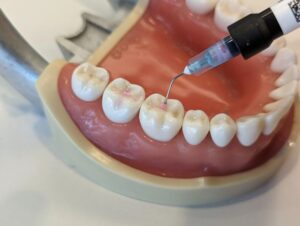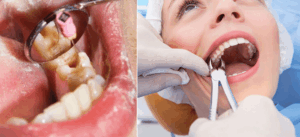Oral surgery is a branch of dentistry where qualified specialists (oral and maxillofacial surgeons) perform surgical procedures involving the mouth, teeth, gums, and jawbone to restore proper function, health, and appearance. These treatments address complex dental issues such as impacted wisdom teeth, jaw irregularities, and oral infections.
For those wondering, “What is oral surgery and when is it needed?”, this section outlines the main procedures, reasons for treatment, preparation guidelines, what occurs during surgery, and tips for recovery, all provided to help patients make well-informed decisions about their dental care. If you’re seeking expert advice or treatment options, consulting the best dentist in West Hollywood can help ensure the highest level of care and results.
Definition of Oral Surgery
Oral surgery refers to the surgical treatment of diseases, injuries, and defects affecting the teeth, gums, jaw, and facial structures. These procedures are performed by oral and maxillofacial surgeons, who receive years of additional training in both dental and medical surgery. Their expertise includes administering anesthesia safely, managing complex surgical cases, and ensuring proper healing.
By using advanced surgical techniques and imaging technology, oral surgeons restore both function and aesthetics, improving chewing, speech, and facial balance. These treatments play a critical role in maintaining long-term oral health and overall well-being.
Types of Oral Surgeries
Oral surgery includes a range of procedures aimed at correcting structural, functional, and cosmetic issues. The most common types include:
- Tooth extraction: Removal of severely decayed, infected, or impacted teeth (especially wisdom teeth).
- Dental implants: Replacement of missing teeth with titanium posts that support artificial crowns for natural function.
- Jaw (orthognathic) surgery: Correction of skeletal abnormalities that affect bite, facial symmetry, or breathing.
- Periodontal surgery: Treatment of advanced gum disease to restore healthy tissue and bone support.
- Facial trauma repair: Reconstruction of bone and soft tissue following injury.
Each type of oral surgery serves a specific purpose, from restoring bite strength to improving confidence through a healthy, balanced smile.
Reasons for Oral Surgery
Oral surgery becomes necessary when non-surgical treatments cannot resolve the underlying issue. Common reasons include:
- Impacted wisdom teeth causing pain, swelling, or infection.
- Missing teeth requiring implant placement for long-term restoration.
- Jaw alignment issues leading to difficulty chewing or speaking.
- Facial injuries or bone fractures that need corrective procedures.
- Chronic oral infections or cysts requiring removal for full recovery.
- Sleep apnea that can be improved by repositioning tissues to enhance airflow.
Each surgical procedure is designed to restore comfort, function, and aesthetics, improving a patient’s overall oral health and confidence.
Preparing for Oral Surgery
Proper preparation helps ensure a safe procedure and successful healing. Before your appointment, your oral surgeon may recommend:
- Fasting for several hours if general anesthesia is planned.
- Arranging transportation home after surgery.
- Disclosing all medications, supplements, and health conditions.
- Avoiding blood-thinning medications unless otherwise directed.
- Following all pre- and post-operative instructions carefully.
Patients often find reassurance in positive reviews and feedback from others who have undergone similar procedures, as this helps set realistic expectations for recovery and outcomes.
What Happens During Oral Surgery
During the procedure, your oral surgeon uses specialized instruments to remove or repair affected tissues while ensuring maximum precision and comfort. Local or general anesthesia is administered based on the type of surgery.
Once anesthesia takes effect, the surgeon makes small incisions to access the surgical area. Using precision tools, they perform the required procedure, such as extracting a tooth, placing an implant, or reshaping bone. The surgical team continuously monitors your vital signs for safety and comfort.
After the operation, the site is sutured and you’ll receive detailed care instructions for a smooth recovery.
Recovery After Oral Surgery
Recovery time varies depending on the type of surgery performed, but following post-operative guidelines can speed up healing and reduce discomfort.
- Apply ice packs during the first 24 hours to reduce swelling.
- Stick to soft foods and avoid using straws for a few days.
- Keep the mouth clean by gently rinsing with saltwater as directed.
- Take prescribed pain medication as needed.
- Attend follow-up appointments to monitor healing progress.
Some patients share positive experiences about how following recovery instructions led to faster healing and less pain, reinforcing the importance of attentive post-surgical care.
Oral surgery plays an essential role in restoring both the health and harmony of the mouth and jaw. Whether it’s wisdom tooth removal, implant placement, or corrective jaw surgery, these procedures enhance functionality, comfort, and appearance, leading to a stronger and healthier smile.
Contact Us
At Sargon Dental, we’re here to assist you every step of the way. Whether you’re a new or returning patient, have questions about our services, or need assistance with scheduling, reaching out is easy.
📍 Address: 8711 Sunset Blvd, West Hollywood, CA 90069
📞Phone: 323-990-7533
🕒 Office Hours:
- Monday – Friday: 9:30 AM – 5:00 PM
- Saturday & Sunday: CLOSED
📅 Schedule an Appointment
Ready to take the next step toward a healthier smile? You can schedule an appointment online or by calling our offices directly.
Related Topics:
- What to Do After Oral Surgery for Minimal Pain and Swelling
- What to Eat After Oral Surgery With Stitches: Dentist-Approved Meal Ideas






